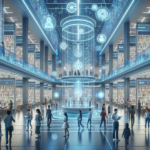In today’s fast-paced world, the pursuit of knowledge is more vital than ever. Advances in artificial intelligence (AI) have the potential to transform how people access and interact with information. This profound shift is spearheaded by leading tech companies like Microsoft, with visionaries such as Mustafa Suleyman at the forefront. By putting knowledge at everyone’s fingertips, AI is set to revolutionize access to information.
The Power of AI in Today’s World
AI is no longer a distant concept of science fiction. Instead, it is embedded in our daily lives, continually reshaping our interaction with the world. From virtual assistants like Alexa and Siri to advanced AI algorithms that drive business intelligence, we are witnessing the beginning of an AI-driven era.
Muhammad Suleyman, a prominent figure in AI development at Microsoft, envisions a future where AI plays a pivotal role in democratizing knowledge. In this vision, AI acts as a bridge between individuals and information, making access seamless and universal.
Key Advantages of AI in Knowledge Democratization
- Accessibility: AI tools are designed to make knowledge accessible to anyone, regardless of geographical location or socioeconomic status.
- Efficiency: AI can process and analyze data at incredible speeds, providing users with immediate insights and solutions.
- Personalization: Advanced AI algorithms tailor information to individual preferences, ensuring relevance and engagement.
AI Bridging Knowledge Gaps
The digital divide is a pressing global issue, and many communities lack access to critical resources. AI offers a solution by bridging these gaps through tools that facilitate learning and development.
Applications That Empower Users
- Language Translation: AI-powered translation tools break down language barriers, enabling users from different linguistic backgrounds to access the same knowledge base.
- Educational Platforms: AI-driven educational technologies enhance learning experiences by providing interactive and adaptive content to students worldwide.
- Health Information: AI systems can analyze medical data, making healthcare knowledge accessible to both practitioners and patients.
Challenges in AI Adoption
While the benefits of AI are undeniable, the journey toward its full adoption comes with its share of hurdles:
- Data Privacy: As AI relies heavily on data, ensuring the privacy and security of user information is paramount.
- Bias and Fairness: Bias embedded within AI systems can perpetuate inequality. Addressing these biases is crucial for equitable knowledge access.
- Infrastructure: Developing countries may lack the infrastructure needed to fully integrate AI technologies into their societal framework.
The Role of Companies Like Microsoft
Tech giants like Microsoft are key players in advancing AI’s capabilities and ensuring these technologies are used ethically. Through strategic initiatives and collaborations, they aim to uphold AI principles that promote trust and transparency.
Microsoft’s AI Initiatives
- Responsible AI Framework: Establishing guidelines and protocols to promote ethical AI use and safeguard users’ interests.
- Partnerships with Educational Institutions: Collaborating with universities to integrate AI into educational curricula and research.
- AI for Accessibility: Developing tools aimed at making technology more inclusive and supportive for individuals with disabilities.
The Future of AI and Knowledge Access
As AI technology continues to evolve, its role in democratizing knowledge will undoubtedly expand. This evolution paves the way for a more informed society where information is not a privilege for the few but a right for all.
Emerging Trends
- Augmented Reality (AR) and Virtual Reality (VR): Integration with AI to create immersive learning environments that bring abstract concepts to life.
- Cloud-Based AI Solutions: Leveraging cloud technologies to provide scalable AI applications accessible anywhere, anytime.
- AI and IoT (Internet of Things): AI-driven IoT solutions that enhance connectivity and smart decision-making across devices.
The potential for AI to revolutionize knowledge access is enormous. By focusing on ethical practices and overcoming adoption challenges, we can ensure AI serves as a powerful tool for global empowerment.
With continued innovation and collaboration, the vision of AI placing knowledge at everyone’s fingertips is within our reach. As we embrace this future, the possibilities are limitless, promising a society where information is free-flowing and universally accessible.








